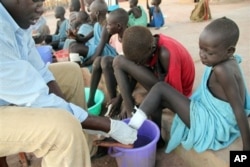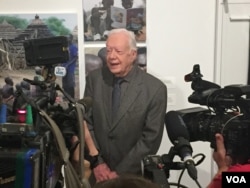When former President Jimmy Carter announced he was battling cancer in an August 2015 news conference at his Atlanta-based nonprofit Carter Center, he shared that one of his hopes was that the last Guinea worm would be eradicated before he died.
"I still have the same hope," Carter told VOA in an exclusive interview at the Carter Center, almost 17 months after his cancer announcement.
He is still focused on promoting the fight against Guinea worm, also known as dracunculiasis, a neglected tropical parasitic disease that as recently as the 1980s afflicted millions of people in 21 countries.
It is transmitted by drinking water that is contaminated with microscopic larvae that carry the parasite. The worm matures in the human body over the course of a year. Once mature, the worm, sometimes as long as one meter, slowly emerges through blisters on the skin, generating intense pain for those infected.
"They afflict people in the poorest and most isolated places in the world," Carter told an audience gathered at the Jimmy Carter Library and Museum on Wednesday, during an unveiling of its newest exhibit "Countdown to Zero," a look at disease elimination and eradication programs produced in conjunction with the American Museum of Natural History.
The Carter Center also has released its annual update on global Guinea worm eradication numbers.
In 2016, three countries reported cases of Guinea worm — South Sudan, Ethiopia and Chad. A fourth country, Mali, which had cases of the disease in 2015, is reported to be free of the parasite for the first time.
"It means you've had a 25 percent reduction in the number of countries reporting cases," said Frank Richards, who heads several of the Carter Center's eradication and elimination programs.
While the eradication effort now focuses on those three countries where the parasite remains, the overall number of cases has slightly increased.
"The difference between 22 cases last year and 25 cases this year is trivial," said Donald Hopkins, former director of the Carter Center's health programs and an expert on disease eradication.
But the challenge that remains is reaching and maintaining a presence in those villages where the parasite is still infecting unsuspecting hosts.
"When you get to the final numbers of cases, generally they are in the places that are the most difficult to reach," Richards explained, "either because of remoteness or insecurity and instability, and Mali is one of those examples, as is South Sudan."
"Those last few cases in any eradication program are always the most severely problematic," Carter told VOA.
Carter’s health
As the Carter Center's global fight against Guinea worm wages on, so does his battle with cancer.
"I'm doing fine, I'm much better than I was when we had the press conference here," he told CNN's Sanjay Gupta during a panel discussion on eradication efforts in the Carter Center's auditorium. "I had cancer in my liver, part of it that was removed, and I had four spots on my brain that were malignant. I get another MRI tomorrow, but so far my brain and liver have been clear of the disease."
While his battle with cancer appears successful, Carter, 92, is mindful that even if his hope of outliving the last Guinea worm isn't realized, he is confident the Carter Center and its partners will reach the goal of complete eradication.
"I'm not looking forward to not being here," he told VOA, through his signature grin, "but I think when I'm gone, the effort will not be abandoned, it will be continued, maybe with an even greater degree of enthusiasm because it would be in my memory and that sort of thing. So I don't feel concerned about the future."
Of the effort, Richards told VOA, "I think it's in our human DNA to reach a supreme accomplishment, and this is the supreme accomplishment in public health."







